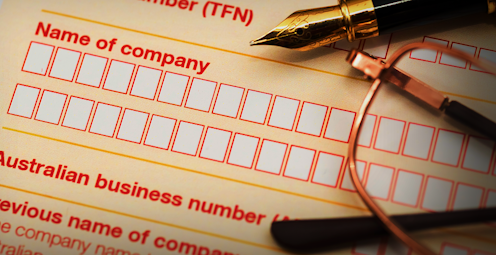‘Robotax’ is a symptom of a gap in Australia’s tax laws. Here’s how to fix it
- Written by The Conversation

Imagine believing you owed nothing to the Australian Tax Office, and then suddenly finding out decades later that you did, and that the Tax Office had been accruing interest and penalties on it for decades.
You might think it was like Robodebt, the disgraced scheme under which the government tried to extract money from welfare recipients that was eventually found to be unlawful by a Royal Commission.
You might even call the scheme “Robotax”. This is how it is being referred to in reporting. It is eventually expected to collect debts on hold worth A$15 billion.
On Wednesday Tax Commissioner Chris Jordan said he hadn’t wanted to pursue these old (and in some cases very small) debts but had been forced to after the Australian National Audit Office told the Tax Office it had no legal authority not to chase them.
“As a regulator, we can’t purposely not conform with the law,” he told the National Press Club. “We have to, so we’re working our way through.”
Small debts climb to tens of thousands
Here’s an example, from our Tax and Business Advisory Clinic at the University of NSW.
One of our clients had previously been involved in a small business with her husband. When he tragically died she was left to look after their children on her own and told she didn’t owe the Tax Office any money.
But when she recently returned to work and lodged her tax return, a long-absent tax debt reappeared. It turns out that although she had been told it was “written off” at the time, it had only been classified as “non-pursuit”.
Non-pursuit meant it hadn’t appeared in her or her husband’s tax statements.
By the time it reappeared, she owed $37,000. The clinic was able to establish that most of this – about $29,000 – was interest and penalties.
We asked the Tax Office to waive the interest and penalties, which, to its credit, it did. It’s an option many financially vulnerable taxpayers won’t know they have and won’t know how to get without professional advice (which they can’t afford).
It gives government-funded tax clinics a valuable role.
How it happened
The Tax Office has for many years been classifying debts as “written off” or “not economical to pursue”, usually where the debts are small or it has lost contact with the taxpayer.
Commissioner Jordan told the Press Club his view had been it was “ridiculous” to spend money chasing debts as low as $2.
But a taxpayer might not realise this has happened, or might not have realised that “written off” doesn’t have its standard English meaning. Debts written off continue to exist. Without a statute of limitations on them, they cannot expire.
The Tax Office merely decided not to pursue them. On their statements, these taxpayers saw no acknowledgement of these debts and often saw a balance of “nil” on their accounts.
New advice from the Australian Government Solicitor has forced the Tax Office to collect these debts where would have preferred not to, even where the clients are old or on low incomes.
Read more: Robodebt was a fiasco with a cost we have yet to fully appreciate
Temporary halt
On Wednesday, the Tax Office said it had “heard the concerns raised by the community” and paused all recovery action on debts placed on hold prior to 2017, a temporary solution whose legal basis is unclear.
In Australia, there is no statute of limitations on tax debts placed on hold, even though US research has found tax debts not collected within two years of assessment are unlikely to be collected at all.
Although Australia’s Finance Minister has the power to waive individual debts, it is unclear whether this could be used to waive an entire class of debts.
And there is one class of debts the minister has no power to waive, even in cases of extreme hardship – those from businesses that have collected the goods and services tax.
The Tax Office was warned
The Commonwealth Ombudsman warned the Tax Office of a problem back in 2009 in a report entitled Re-raising Written-off Debts.
It said the Tax Office used the term “write-off” in a way that differed from the commonly understood commercial meaning
It made a number of recommendations, one of which was that the Tax Office:
notify taxpayers about the decision to write off their debt, indicating that there is an amount owing which the Tax Office has decided not to pursue at that time but may seek to do so later.
Another was that the Tax Office:
provide further information to taxpayers when a debt is re-raised. This information should include the source of the debt (including how much interest has been charged), the circumstances which caused the debt to be re-raised and how to obtain further information.
Something else that would help is a requirement to inform those affected that the Tax Office is able to remit interest and penalties – and to offer guidance about how to request this.
Ultimately, it might require legislation
Legislating to give the Tax Office permission to waive debts in certain circumstances would be the best fix, and could probably be done quickly if government ministers are willing.
As he prepared to step down after a decade as Tax Commissioner this month, Jordan pointed with pride to the Tax Office’s status as the third most trusted arm of the Australian public service.
Unless the Tax Office is given the discretion to behave with compassion towards vulnerable Australians, it risks losing that status and perpetuating cycles of debt.
We need a legislative fix. The Tax Office needs in its armoury the ability to help – rather than hinder – people in serious financial hardship. The last thing it should want to do, and want to be seen to want to do, is to squeeze blood from stones.







